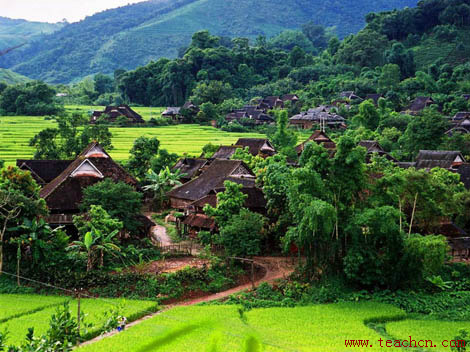Posted 2017/1/7
Xishuangbanna, a famous scenic spot in China, is located at the southernmost tip of Yunnan Province. It is an interim area between the Asian continent and the southeast peninsula. Xishuangbanna scenic spot consists of three areas, namely, the scenic area in Jinghong County, the scenic area in Menghai County and the scenic area in Mengla County, including 19 spots and above 800 sights, with a total area of 1202.13 square kilometers. There are more than 200 thousand hectares of natural reserve, among which, 46.7 thousand hectares are virgin forest which has been well protected. Xishuangbanna is of the tropical rain forest climate, so, without hot summer or cold winter, it is suitable for living in the whole year. And there are many kinds of animals and plants.

The biggest tropical rain forest of China is located in the valley area lower than 500 meters in Xishuangbanna. In this tropical rain forest, many unique, ancient, peculiar and endangered kinds of tropic animals and plants live, structuring many wonderful ecological sights. For example, there are many famous sights, such as the ancient Banyan tree Mengyangxiang looking like an elephant, the Peacock Lake Park with choppy waves, the Olive Dam featuring tropical scene, and the Dushuchenglin tree (one tree forming the woods) of 1000 years old as welll as the Jingzhen Eight Angles Pavilion, Manding Waterfall, the Air Corridor Meng-la-bu-wang-tian tree, the Manshui Tope as Buddhist shrine, the Menglun Arboretum and the Jinghong Virgin Forest Park.
More than 10 minority groups live in Xishuangbanna, such as Dai, Hani, Bulang, Jinuo, Lahu, Wa, and Yao, etc. Among these ethnic groups, the populations of Dai and Han ethnic groups are the largest. Every ethnic group has its own unique festival custom, and the Water-splashing Festival hold by Dai people is the most famous. Special local products are mainly Puer Tea, meal made in sections of thick bamboos, and unique apparel and accessories craftworks of various ethnic groups. Xishuangbanna is not only a kingdom of animals and plants given by nature, but also a grand garden of folk-custom of China's ethnic minorities.